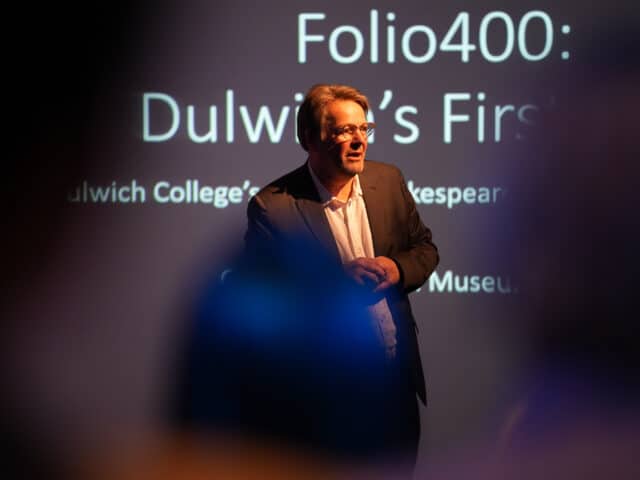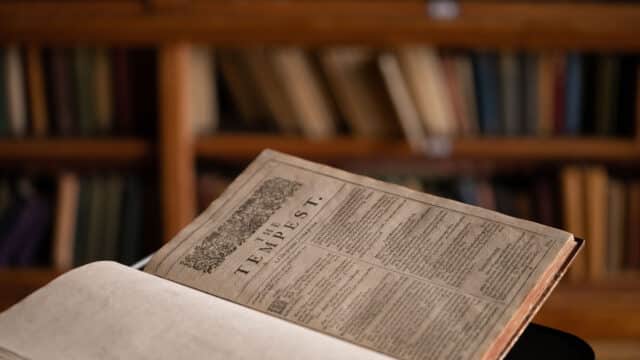Blog
400 years of Shakespeare’s First Folio; a year of engagement

Peter Jolly
Dulwich College
Read the blog
‘Read on this book…’
Hamlet
This year marks 400 years since the publication of Shakespeare’s First Folio, the first collected works of William Shakespeare. The national celebrations have been brought together under the umbrella Folio400 website.
Of the 235 surviving copies three are owned by HMC schools: Dulwich College, Eton, and Stonyhurst. All have devised exciting engagement programmes for this special year. Dulwich holds one of the world’s foremost archives of early modern theatre papers, of which the Folio is just a part.
The anniversary allowed us to build on the success of our loans in 2016 to Shakespeare’s Globe, marking the 450th anniversary of Shakespeare’s death. We have always taken every opportunity to share the treasures in our Archive for wider public benefit, as well as seeking to engage effectively with students from the College and our partner schools, state and independent.
Remarkably we can trace our first folio’s roots directly to one of Shakespeare’s actors. Dulwich College was founded in 1619 by the great actor, philanthropist, and impresario Edward Alleyn. He worked alongside Shakespeare on Bankside and is believed to have created the first consciously created theatrical archive at the College. However, our copy of the Folio is thought to have been passed to the College somewhat later: in 1686 from the estate of the actor and bookseller William Cartwright. Cartwright performed with the King’s Company and is known to have played Brabantio in Othello and Falstaff in Henry IV Part I and Part II.

The two volumes of Comedies and Histories (sadly the Tragedies are missing) contain evidence of its possible use in theatrical performances. The absence of the Tragedies tells its own story of ownership and bookselling during the time of the Commonwealth. Handwritten annotations, ink and water stains, and burn holes suggest these volumes were well-used before they were left to Dulwich College. Each Folio has its own unique history that is not only contained in its provenance but can be read in the condition of the pages themselves; every candle wax splutter, and inky fingerprint gives a folio its own story. Finding a narrative for students, academics and public alike is crucial.
An exhibition to be held at Dulwich College throughout November will use key documents in our collection to tell the story of the creation of the Folio. It will be open by appointment to the public and schools, especially those partnered with the College in Southwark (the Southwark Schools’ Learning Partnership and the Southwark Community Education Charity) and abroad. The content will be specifically aimed at students, incorporating artefacts including replica ink bulbs and type cases. It will be accompanied by Year 9 Drama students devising their own response to the story of the Folio’s creation, and by a Year 12 Art installation inspired by the themes of printing and paper. The aim of the Archive within the College is to use its collection to inspire current students to research, respond and create.

The centrepiece of the year was a six-month loan of our Folio to Royal Museums Greenwich for the Tempest and the Thames display. Not only did this allow our documents to be seen by a vast number of visitors, but it also proved to be the catalyst for the recent Shakespeare and the Sea conference run by the National Maritime Museum. The conference linked Shakespeare with maritime studies in the new discipline of the ‘Blue Humanities’, exploring the close relationship between culture and the sea. The conference discussed exciting ways in which interpretation of Shakespeare can help us confront current day issues, particularly environmental and immigration policy. Such is the power of Shakespeare and the Folio to inspire.
A further project for the year was to engage with audiences beyond the College through digital media. Dulwich participated in the open-access ‘Folios Compared Project’, run by publisher Adam Matthew through AM Digital. This involved digitising our Folio and placing it on a platform that enables the general public, scholars and students to compare Folios around the world page by page. Our copy sits alongside those from the Folger, British Library, Auckland Libraries Heritage Collection, and the RSC. The resource will be invaluable for academic purposes.
From a personal point of view, it has been an extraordinary experience to lead on the Dulwich College’s celebration of the Folio’s anniversary. The College has a proud record of producing theatre practitioners and academics, and many have been inspired by our archive. Although we can measure visitor counts in exact numbers, the extraordinary impact that meeting the Folio face to face has on students and the wider public can never be fully measured.
Peter Jolly was Director of Drama at Dulwich College for over thirty years and now works in the College’s archive specialising in the early modern theatre collection.


